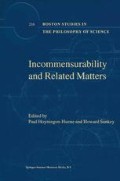Abstract
In this paper, I defend the relativity of scientific reasoning and knowledge to scientists’ diverse normative allegiances to historically variable standards of theory assessment. My aim is to justify a position of moderate relativism. This position seeks to accommodate the essential role of evidence, reasons, and reasoning in scientific choice/belief; while also giving sociological and historical factors an essential role in explaining and justifying which reasons and choices prove compelling to some scientists but not others who are equally rational and scientific. My strategy of argument is to take up the main criticisms of this sort of position in the work of post-Kuhnian writers such as Laudan, Lakatos, Siegel, Shapere, Scheffler, Sankey, and others. In particular, I examine the following influential rebuttals of relativism: (1) It is self-refuting; (2) It is refuted by the existence of rational debate in science; (3) It is refuted by the existence of neutral, external, universal standards of theory-assessment in science; (4) It is refuted by the fact that there are typically good scientific reasons for preferring some standards to others, which relativists cannot see because they embrace a misguided holistic paradigm of scientific change; (5) It is refuted by normative naturalism which provides an objective, ahistorical, and empirical method for evaluating the effectiveness of standards of scientific knowledge in attaining the aim or aims of scientific inquiry. I acknowledge the insights of these positions. But, I argue, they fail to rebut moderate relativism, and in particular, the relativity of reason and justification to diverse, historically shaped normative commitments to rival conceptions of scientific knowledge. The enduring philosophical contribution of Kuhn lies not in radical relativism, extreme incommensurability, or virulent anti-realism. Rather, it consists in the promise of a more interdisciplinary model of scientific knowledge and the logic of its growth.
Access this chapter
Tax calculation will be finalised at checkout
Purchases are for personal use only
Preview
Unable to display preview. Download preview PDF.
References
Doppelt, G. (1978). “Kuhn’s Epistemological Relativism: An Interpretation and Defense.” Inquiry 21: 33–86; reprinted in J. Meiland and M. Krausz, eds., (1982), Relativism: Cognitive and Moral, pp. 113–146, Notre Dame: University of Notre Dame Press.
Doppelt, G. (1980). “A Reply to Siegel on Kuhnian Relativism.” Inquiry 23: 117–123.
Doppelt, G. (1983a). “Laudan’s Pragmatic Alternative to Positivism and Historicism.” Inquiry 24:253–271.
Doppelt, G. (1983b). “Relativism and Recent Pragmatic Conceptions of Scientific Rationality.” In N. Rescher, ed., Scientific Explanation and Understanding: Essays on Reasoning and Rationality in Science, pp. 106–142, London: University of Pittsburgh and University Press of America.
Doppelt, G. (1986). “Relativism and the Reticulational Model of Scientific Rationality.” Synthese 69: 225–252.
Doppelt, G. (1988). “The Philosophical Requirements for an Adequate Conception of Scientific Rationality.” Philosophy of Science 55: 104–133.
Doppelt, G. (1990). “The Naturalist Conception of Methodological Standards.” Philosophy of Science 57: 1–19.
Laudan, L. (1977). Progress and Its Problems. Berkeley and Los Angeles: University of California Press.
Laudan, L. (1981). Science and Hypothesis. Dordrecht: Reidel.
Laudan, L. (1984). Science and Values. Berkeley and Los Angeles: University of California Press.
Laudan, L. (1987). “Progress and Rationality? The Prospects for Normative Naturalism.” American Philosophical Quarterly 24: 19–31.
Leplin, J. (1990). “Renormalizing Naturalism.” Philosophy of Science 57: 20–33.
Rosenberg, A. (1990). “Normative Naturalism and the Role of Philosophy.” Philosophy of Science 57: 34–43.
Sankey, H. (2000). “Methodological Pluralism, Normative Naturalism and the Realist Aim of Science.” In R. Nola and H. Sankey, eds., After Popper, Kuhn and Feyerabend: Recent Issues in Theories of Scientific Method, pp. 211–229, Dordrecht: Kluwer.
Shapere, D. (1982). “The Concept of Observation in Science and Philosophy.” Philosophy of Science 49: 485–525.
Shapere, D. (1984). Reason and the Search for Knowledge. Boston Studies in the Philosophy of Science, Volume 78. Dordrecht: Reidel.
Siegel, H. (1980). “Epistemological Relativism In Its Latest Form.” Inquiry 23: 107–117.
Siegel, H. (1987). Relativism Refuted. Dordrecht: Reidel.
Author information
Authors and Affiliations
Editor information
Editors and Affiliations
Rights and permissions
Copyright information
© 2001 Springer Science+Business Media Dordrecht
About this chapter
Cite this chapter
Doppelt, G. (2001). Incommensurability and the Normative Foundations of Scientific Knowledge. In: Hoyningen-Huene, P., Sankey, H. (eds) Incommensurability and Related Matters. Boston Studies in the Philosophy of Science, vol 216. Springer, Dordrecht. https://doi.org/10.1007/978-94-015-9680-0_6
Download citation
DOI: https://doi.org/10.1007/978-94-015-9680-0_6
Publisher Name: Springer, Dordrecht
Print ISBN: 978-90-481-5709-9
Online ISBN: 978-94-015-9680-0
eBook Packages: Springer Book Archive

